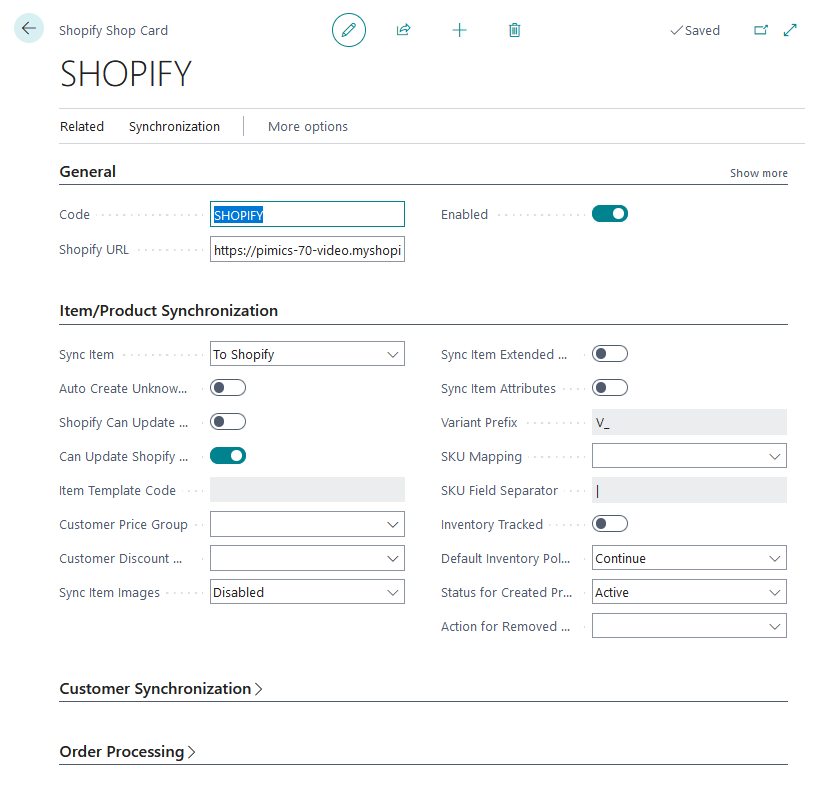If you’ve ever heard of e-commerce, chances are, you’ve also heard about Shopify. Shopify is one of the leading e-commerce platforms and communities popular worldwide. Second only to Woo Commerce in market share, Shopify has (as of November 2022) more than 5.6 million stores online, representing 1.75 million merchants.
If you use Business Central and ever searched for a PIM solution to go with it, chances are you heard about Pimics too. Pimics is the only PIM product to work directly under Dynamics Business Central, representative of what we call PIM-in-ERP.

Pimics-Shopify via Business Central
It is well understood that Pimics works very well with any e-commerce platform because of its data exchange capabilities. Still, there are a few reasons why Shopify is a perfect fit for our PIM solution. The main reason has to do with the fact that, at some point in the not-so-distant past, people at Microsoft decided that Dynamics Business Central will have a direct integration with the Shopify e-commerce platform. As a result, companies can now configure items, customers, and order data synchronisation for Shopify directly inside Business Central.

As Pimics is a Business Central-only PIM solution, for us that means a good opportunity for a solid integration platform to build upon, so that we can offer a future-proof and comprehensive solution to our customers. For companies using Dynamics Business Central, embedded Shopify support means that for selling online, they can now have the full digital stack in one place: their ERP.
Pimics extends the standard Shopify connector in Business Central, to accomodate for rich product data synchronisation. That makes for a truly powerful all-in-one solution for companies that want to have the Shopify ease of use, features and cost-effectiveness, together with the Pimics professional tools for managing product information.
Shopify delivers
Shopify e-commerce has many features that can help you build and grow your online store. It offers broad functionality for its price, and it's also easy to use. Here are some of its key features:
- Customizable online storefront: You can customize your online store’s design and layout to match your brand and style.
- Mobile commerce: You can use Shopify’s mobile app to manage your store, fulfill orders, and communicate with customers.
- Payment processing: Shopify offers a built-in payment processing system that accepts credit cards, PayPal, Apple Pay, Google Pay, and more.
- Inventory management: You can track your inventory levels, receive notifications when stock is low, and automatically reorder products.
- Marketing tools: Shopify offers a variety of marketing tools to help you promote your store, including email campaigns, social media integration, and SEO optimization.
Extended synergies
As much as Shopify (or any other e-commerce platform for that matter) offers in the way of ease of use and needed functionality for managing your webshop, PIM empowers you to do much more. Especially when your product range expands into thousands or more.
In the Shopify-Pimics-BC equation, Pimics is your empowering tool for centralized, automated and error-free product catalog management – the key block in your IT stack to take the pressure off, freeing up your time to focus on growing revenue.
And now for a set of compelling additional benefits allowed by the the Shopify-Pimics-BC integration:
1. Accurate inventory information
For a truly accurate display of your available inventory on your webshop, you absolutely must take this information from the originating point - your ERP. The Business Central - Pimics combo is unbeatable when it comes to having happy customers who always see real-time availability information for your products.
2. High quality product data
This is the main advantage a PIM provides: high quality, consistent data stored in one place. By the standard functionality it provides like inheritance, bulk changes and data quality assurance, Pimics ensures that using intelligently managed product data and categorization, with a minimum of user effort, results in maximized customer satisfaction, increased sales and reduced returns.
3. Short time-to-market
Using PIM enables organizations to move fast in highly competitive markets. Up to 80% faster. It ensures miminum delays in data preparation through centralized product data management, automation, and powerful text localization management. Do you want to sell in a new geography? Just prepare the translations for the new language, create a new publication in Pimics, select the products you want to sell there, and set up the automated data export to the new webshop. That simple.
4. Multi-webshop synchronisation
When managing several webshops, PIM is a must-have. It keeps your product information organized and current, while at the same time avoiding duplication of such processes as updating product data sets, product data feed management or systems integrations. The more online stores you have and the more items you sell, keeping them all updated can become an unsovable puzzle without a powerful tool such as Pimics.
5. Improved SEO
Your goal should be to get your products on the top of the digital shelf, among the first 20 search results of search engines like Google or Bing. PIM can be leveraged in order to boost your SEO strategy, that in turn will help you reach that goal. It offers you complete and consistent product titles and descriptions, and simplifies your task in maintaining SEO-friendly product data. It also gives you the tools to manage your keywords and metadata, thus optimizing your digital assets from a SEO point of view.
6. Easy management for categories
Shopify products are organized into what Shopify calls collections, not categories. Managing collections (which have no hierarchy) as hierarchical categories in Pimics aligns well with how businesses and customers are used to navigating large product catalogs. Plus, Pimics can generate SEO related category metadata such as breadcrumbs, category filters, category page titles and descriptions, images, etc. This will allow shoppers to efortlessly discover your products.
Are you ready to become a Pimics+Shopify statistic? Get in touch with us
here!